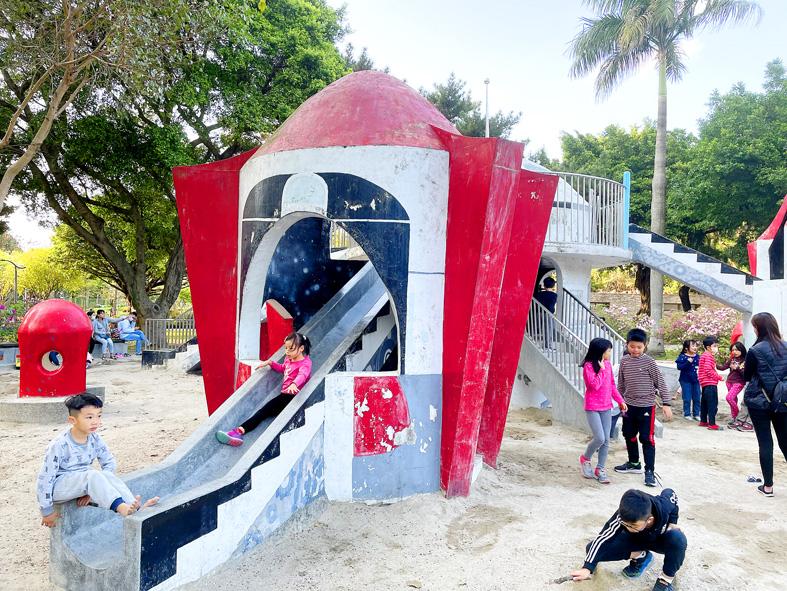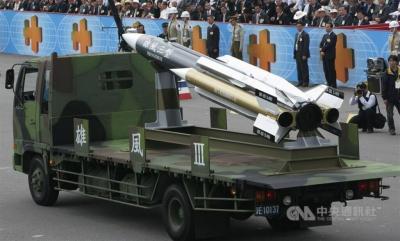On a breezy Sunday afternoon, laughter rose from a playground complex that looks like a red and white space fort in Youth Park in Taipei’s Wanhua District (萬華). It was built 30 years ago to commemorate the moon landing, but it is now seen as an icon that marks the development of playscape in Taiwan.
Children would not have the chance to play in this playground if it were not for a group of mothers who fought for its conservation and urged development of similar play areas for children.
To pass on their experience, the group, called Parks and Playgrounds for Children by Children, last year published a book about the movement, which also secured a promise from Premier Su Tseng-chang (蘇貞昌) to direct the Ministry of Health and Welfare to coordinate related efforts for children’s right to play.

Photo: CNA
Youth Park’s composite structures — comprising rocket installations, space-themed murals, grid nets and slides designed for different age groups — narrowly escaped demolition in 2015, when the Taipei City Government tore down two terrazzo slides without prior notice and announced plans to demolish 60 more in the city due to safety concerns.
That move prompted an unexpected outcry from 3,000 parents, who staged a protest demanding Taipei Mayor Ko Wen-je (柯文哲) stop tearing down such facilities and building small, short and generic playground equipment as a convenient solution.
“Children have a right to play, and they deserve better than canned-food playgrounds,” said Christine Lee (李玉華), one of the protesters who were originally loosely connected through Facebook.
With more studies about the city’s resources for children’s recreation, which were extremely scarce back then — Lee and a dozen mothers in 2018 established the group to promote the welfare of Taipei’s youngest residents.
“Can you imagine there were only four sandpits and 30 swings for a total of 320,000 children in Taipei?” she said.
Citing the Convention on the Rights of the Child, adopted by UN members in 1989 and written into Taiwanese law in 2014, Lee said it was a universal value “for children to have rest and leisure, as well as to engage in play and recreational activities.”
The pursuit of that value might be particularly relevant in Taiwan, which has been struggling with an aging society and low fertility.
Taiwan’s population began to decline last year after peaking at 23.6 million in 2019, National Development Council data showed.
Taiwan might become a super-aged society by 2025, meaning that one in five people would be older than 65 years, the council said.
In response, the government in the past few years launched various incentives to build an environment more friendly toward child-rearing — including giving subsidies, and establishing more public kindergartens and recreation facilities.
Acting in line with the government’s policy, the group’s calls to retain characteristic playgrounds and introduce inclusive parks — those designed to be accessible to all children regardless of age and physical accessibility — were finally answered.
After rounds of negotiations with the parents, the city government decided to not only keep the slides, including the one in the space fort, but also to refurbish them to make them safe.
Yu Kuo-jen (尤國仁), an official at the Taipei Public Works Department who oversees the city’s parks, remembered the challenges when he was assigned to communicate with the parents.
There were quarrels in the beginning, which also involved other stakeholders who were more concerned about the safety of nongeneric playgrounds, but all sides eventually reached a consensus, he said.
The parents have since joined hands with local governments to reshape 100 playgrounds across the nation, and they have also started networking with similar organizations worldwide for information exchanges, such as UK-based Playing Out, Chapter Zero Singapore and Tokyo Play.
The public-private sector collaboration between the parents and the city government also resulted in a virtuous circle, as new parks began to involve their primary users, children, from their early stages of development.
One of the best examples is the Huashan Grassland Playground in the city’s Zhongzheng District (中正), which took children as the main consultants in the design process from start to finish.
The children were first invited to submit their design ideas and demonstrate how they use playground equipment, Lee said.
The studies were then presented to the parents for further input, and during a year of park construction, kids were allowed to participate in real work, such as laying tiles, she said.
During the process, mothers of different backgrounds proved to city government officials that they can be experts on children’s needs and convinced them of the feasibility of playground transformation, she said.
“It has been a lesson in civic engagement for us, too,” Lee said, adding that she hoped she and her two children could learn how to pay attention to public affairs, find solutions and keep the completed projects sustainable.
While those playgrounds have laid the cornerstone for children to better enjoy their childhood, Lee and fellow group members agreed that it is the parents’ attitudes that matter more.
A child will not necessarily grow up well in those parks if their caretakers are absorbed in their cellphones, they said.

STATS: Taiwan’s average life expectancy of 80.77 years was lower than that of Japan, Singapore and South Korea, but higher than in China, Malaysia and Indonesia Taiwan’s average life expectancy last year increased to 80.77 years, but was still not back to its pre-COVID-19 pandemic peak of 81.32 years in 2020, the Ministry of the Interior said yesterday. The average life expectancy last year increased the 0.54 years from 2023, the ministry said in a statement. For men and women, the average life expectancy last year was 77.42 years and 84.30 years respectively, up 0.48 years and 0.56 years from the previous year. Taiwan’s average life expectancy peaked at 81.32 years in 2020, as the nation was relatively unaffected by the pandemic that year. The metric

Taiwan High Speed Rail Corp. (THSRC) plans to ease strained capacity during peak hours by introducing new fare rules restricting passengers traveling without reserved seats in 2026, company Chairman Shih Che (史哲) said Wednesday. THSRC needs to tackle its capacity issue because there have been several occasions where passengers holding tickets with reserved seats did not make it onto their train in stations packed with individuals traveling without a reserved seat, Shih told reporters in a joint interview in Taipei. Non-reserved seats allow travelers maximum flexibility, but it has led to issues relating to quality of service and safety concerns, especially during

A magnitude 5.1 earthquake struck Chiayi County at 4:37pm today, the Central Weather Administration (CWA) said. The hypocenter was 36.3km southeast of Chiayi County Hall at a depth of 10.4km, CWA data showed. There were no immediate reports of damage resulting from the quake. The intensity of the quake, which gauges the actual effect of a seismic event, measured 4 in Chiayi County, Tainan and Kaohsiung on Taiwan's seven-tier intensity scale, the data showed. The quake had an intensity of 3 in Chiayi City and Yunlin County, while it was measured as 2 in Pingtung, Taitung, Hualien, Changhua, Nantou and Penghu counties, the data

The Supreme Court today rejected an appeal filed by former Air Force officer Shih Chun-cheng (史濬程), convicted of Chinese Communist Party (CCP) espionage, finalizing his sentence at two years and two months for contravening the National Security Act (國家安全法). His other ruling, a ten-month sentence for an additional contravention, was meanwhile overturned and sent to the Taichung branch of the High Court for retrial, the Supreme Court said today. Prosecutors have been notified as Shih is considered a flight risk. Shih was recruited by Chinese Communist Party (CCP) intelligence officials after his retirement in 2008 and appointed as a supervisor